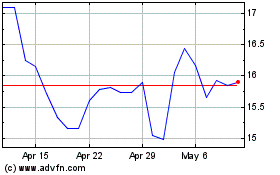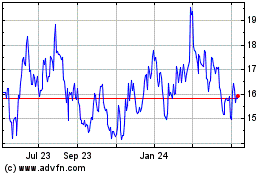Alibaba Group Holding Ltd. dominates the Chinese e-commerce
market, but it increasingly is watching its back, thanks to a swarm
of industry newcomers.
The clearest threat is from JD.com Inc., a longtime rival.
Indeed, in China their rivalry has earned the nickname "the great
cat and dog war"—referring to the respective mascots of Alibaba's
Tmall website and JD.com.
Alibaba's maneuvers to keep the Uniqlo brand of basic-fashion
clothing selling well on its own platform illustrates the stakes
involved on what is now the world's biggest online retail market,
with 2.82 trillion yuan ($441 billion) in transaction volume last
year.
During the past several months, Alibaba and other shopping sites
have tried to snag high-profile brands with exclusive contracts or
product launches, demanded vendors on their sites offer deep
discounts, and sniped at each other in the media and in
speeches.
In late April, Alibaba founder Jack Ma made a personal pitch to
Tadashi Yanai, the head of Uniqlo's parent company, Fast Retailing
Co., Asia's largest apparel maker. Fast Retailing had recently
started selling its popular Uniqlo line of clothing on JD.com, and
sales were brisk. Mr. Ma and his team told Mr. Yanai that if Uniqlo
increased its loyalty to Alibaba's platform, Alibaba would drive
more traffic and sales to Uniqlo's shop there, according to people
familiar with the discussions.
In July, Uniqlo left JD.com's platform, saying a presence on
JD.com wasn't in line with its e-commerce strategy.
JD says the departure must have been "based on something other
than performance" because demand was strong. Uniqlo declined to
comment further.
Alibaba has roughly 80% of all Chinese online shopping sales
flowing through its sites. That dominance is underpinned by
Alibaba's massive online bazaar, Taobao, which hosts roughly eight
million sellers, many of them individuals. JD.com's equivalent,
called Paipai, is much smaller but doesn't disclose its exact
number of sellers.
But in the fastest-growing segment of the market, composed of
sales from bigger online businesses and malls such as Alibaba's
Tmall, Alibaba's share was 58.6% in the first quarter of
2015—roughly the same as the previous year—while JD.com has climbed
to 22.8% from 19.2% a year earlier, according to iResearch.
Alibaba says that the amount of business transacted on all its
retail sites, 2.44 trillion yuan in the year ended in March, is
larger than that of the next five biggest players combined.
Yet Alibaba concedes that competition is intensifying. More
niche players are vying for Chinese Internet spending, from Jumei
International Holding Ltd., a Chinese online seller of beauty
products, to electronic discount fashion retailer Vipshop Holdings
Ltd., and Yihaodian, a Chinese Internet grocery store that in July
was taken over by Wal-Mart Stores Inc.
Stiff competition "is just the nature of the business,
especially in China," Alibaba Executive Vice Chairman Joseph Tsai
said during an interview. "The market is so big and the potential
prize of winning is so attractive, you have a lot of entrepreneurs
as well as capital backing them."
The competition is becoming tougher as China's economy cools.
Alibaba on Wednesday posted lower-than-expected revenue of $3.26
billion for the quarter ended in June, amid challenges that include
a maturing business and an expensive move into mobile, though it
also cited one-time items.
Last week, Alibaba took aim at the area where JD.com is
strongest, electronics, by paying about $4.5 billion for a 20%
stake in Chinese electronics retailer Suning Commerce Group
Ltd.
Alibaba has signed agreements in recent months with more than
160 labels that it expects will drive more than 30 billion yuan in
transactions in the coming year to its online shopping mall. At
least 20 of those brands and retailers, such as outdoor wear maker
Timberland and sporting-goods store chain Decathlon, plan to sell
their wares exclusively on Tmall.
"We are concerned" about Alibaba's exclusive deals, said Haoyu
Shen, chief executive officer of JD's Tmall equivalent, JD Mall.
"We don't think it's in the brand's interest to do that."
Mr. Tsai said brands sign exclusive deals with Alibaba because
they know "we can move their product."
The rivalry has waxed passionately at times. Last year, Mr. Ma
said JD.com would "eventually be a tragedy"—remarks he later
apologized for. In a May speech, Alibaba's retail marketplaces
president, Jeff Zhang, said that "as long as Alibaba does
something, [JD] will immediately do the same," referring to
initiatives to target rural markets, sell abroad, get into cloud
computing and Internet payments.
One office in JD's Beijing headquarters is festooned with red
banners, including one that reads "Fight, fight, fight to the end,
just to be No. 1!"
JD also has played off Chinese regulators' recent crackdown on
counterfeits and fraud on e-commerce sites—problems that have
plagued Alibaba and others—saying it can better guarantee that its
merchandise will be genuine, partly because it handles its own
inventory.
In July, the company's billionaire founder, Richard Liu, called
JD "China's online shopping platform of choice for those who value
authenticity and quality," in what some saw as a backhanded swipe
at Alibaba.
Unlike Alibaba, JD.com buys goods from suppliers and sells them
directly to consumers. It also runs a marketplace where brands sell
goods and pay commissions to JD.com. Alibaba doesn't actually sell
products, but instead connects buyers and sellers, and earns money
through advertising and other services it offers to millions of
merchants and individuals using its marketplaces.
One high-end Italian brand opted to open a storefront on JD.com
rather than Tmall because JD gave a written promise to keep
counterfeit and gray-market versions of two of its brands off the
site, said a consultant to the brand.
JD.com says it protects brands' intellectual property regardless
of whether they list on its site.
Alibaba's main pitch is the huge amount of sales its sites
draw.
Earlier this year, Alibaba persuaded Swedish sportswear brand
Fjallraven to list exclusively on Tmall, in exchange for a promise
to drive more traffic to its shop. Fjallraven had previously been
on JD.com and other Chinese sites.
"We got some good conditions," including more visibility on the
site and reduced prices on advertising, said Lin Mingwen, general
manager in China of Fenix Outdoor, Fjallraven's parent. Mr. Lin
said he expects a fivefold increase in Fjallraven's online sales in
China this year compared with last year.
Before that deal, Fjallraven had to price its products lower on
Tmall than elsewhere online in China to be able to join the site's
big promotions, Mr. Lin said. Now that Fjallraven is exclusively on
Tmall, the brand has more flexibility on how it prices its
products, he said.
Alibaba says that it doesn't have a general policy requiring
goods to be priced lower than other e-commerce platforms.
Peter Landers and Eric Pfanner contributed to this article.
Write to Kathy Chu at kathy.chu@wsj.com and Gillian Wong at
gillian.wong@wsj.com
Subscribe to WSJ: http://online.wsj.com?mod=djnwires
(END) Dow Jones Newswires
August 17, 2015 08:15 ET (12:15 GMT)
Copyright (c) 2015 Dow Jones & Company, Inc.
Vipshop (NYSE:VIPS)
Historical Stock Chart
From Oct 2024 to Nov 2024

Vipshop (NYSE:VIPS)
Historical Stock Chart
From Nov 2023 to Nov 2024
